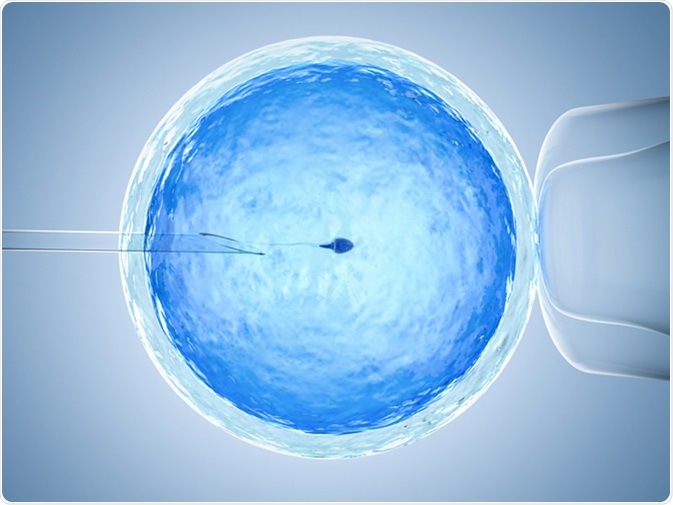Skip to:
What is IVF?
In vitro fertilization (IVF) is a technique used to help those with fertility issues conceive. The process involves the removal of an egg from the woman’s ovaries, which is then fertilized with sperm outside of the body, in a lab. Following fertilization, the embryo is then transferred to the woman’s uterus to develop.

Image Credit: Phonlamai Photo / Shutterstock
Despite its obvious benefit, IVF can be physically and emotionally demanding, and for some, pregnancy does not occur. In addition to this, there is a range of health implications including ectopic pregnancy, side effects from the medication prescribed during the process, and an increased chance of twins or triplets.
Recent research suggests that there may even be a risk of cancer for children born via IVF.
Does IVF Increase the Risk of Cancer?
Researchers from the University of Minnesota examined the prevalence of childhood cancer amongst children conceived through IVF and those conceived naturally. They found that those in the former are more likely to develop cancer.
The longitudinal study followed 2,266,847 children conceived naturally and 275,686 conceived via IVF for over ten years. The results showed a significantly higher prevalence rate of hepatic tumors, both benign and malignant, in those conceived through IVF. Specifically, the rates of children conceived via IVF were 18.1 compared to 5.7 in children conceived naturally.
However, researchers from the University of Minnesota study claimed that, although alarming, they only found a slightly significant link between childhood cancer and IVF. Furthermore, they failed to find a relationship between specific types of IVF treatment and the development of embryonic tumors.
A similar UK-based study following 106,013 children conceived via IVF found no relationship between IVF and prevalence of childhood cancer.
Cancer Risk: Parental Genetics or the IVF Procedure?
A Professor of General Pediatrics at the University College of London, Professor Alastair Sutcliffe commented on whether the increased cancer risk is ascribed to the process of IVF or the genetic nature of infertility. He noted that, despite the potentially life-changing benefits of IVF, research has found that certain types of tumors are more prevalent amongst children conceived via IVF, specifically, hepatoblastoma.
Furthermore, the increased incidence of hepatoblastoma may be caused by the IVF process and not caused by genetics.
However, others have rejected the claim that IVF increases the risk of childhood cancer. Chair of the British Fertility Society, Dr. Jane Stewart noted that limitations of the study might influence the perception of the results from the University of Minnesota researchers.
Namely, the study failed to account for other factors that may influence the development of childhood cancers. Despite there being an association, cause cannot be established fully.
Due to the inconsistency within the literature, one group of researchers conducted a meta-analysis of observational studies to look at the overall association between IVF and cancer prevalence.
Specifically, the researchers examined the incidence of neural tumors, eight subtypes of cancer, overall cancer, hematological malignancies, and other solid tumors.
The research found that children conceived through assisted fertility treatments had a significantly higher risk of developing hepatic tumors, solid tumors, overall cancer and hematological malignancies.
However, similar to Dr. Stewart’s statement, the researchers concluded that the findings failed to outline whether the increase in cancer risk was related to the parents’ infertility itself or to something related to the fertility treatment.
Complementary research found mixed results regarding the prevalence of cancers in similar samples. The study analyzed the health information of all children born in Norway between 1984 and 2011.
Specifically, they examined the cancer risk in adolescence and childhood in those conceived via assistive reproductive technology (ART) – the in vitro handling of eggs, sperm, and embryos to establish pregnancy – and those conceived without ART.
The study had a sample of 1,628,658 children, of which 25,782 were conceived via ART. They found that the overall cancer risk was not greater in children conceived via ART, but that there was an increased risk of developing leukemia and Hodgkin lymphoma.
Similar research found there to be no association between ART and overall childhood cancer. A Dutch study used a follow-up cohort design followed children on average for 21 years to investigate the overall cancer risk in those conceived naturally versus those conceived through ART. They found that the cancer risk for all cancer types was not significantly increased in those conceived through ART compared to naturally.
In light of the contrasting literature, it is clear that more research is needed to examine the mechanisms responsible for the increase in cancer risk in children conceived through IVF or ART. Specifically, examining whether the risk of developing cancer is related to parental infertility or fertility treatment.
Sources
- Zoppi, Lois. 2019. Children born via IVF more likely to develop cancer later in life. News-Medical, viewed 11 February 2020, www.news-medical.net/.../...ikely-to-develop-cancer-later-in-life.aspx.
- NHS (2018). IVF. https://www.nhs.uk/conditions/ivf/
- Spector, L. G. et al. (2019). Association of In Vitro Fertilization with Childhood Cancer in the United States. JAMA Pediatrics. Doi: 10.1001/jamapediatrics.2019.0392, https://jamanetwork.com/journals/jamapediatrics/fullarticle/2729182
- Reigstad, M. M. et al. (2016). Risk of Cancer in Children Conceived by Assisted Reproductive Technology. Pediatrics. Doi: 10.1542/peds.2015-2061, pediatrics.aappublications.org/.../peds.2015-2061.full.pdf
- Spaan, M. et al. (2019). Risk of cancer in children and young adults conceived by assisted reproductive technology. Human Reproduction. Doi: 10.1093/humrep/dey394, https://academic.oup.com/humrep/article/34/4/740/5306245
- Wang, T. et al. (2019). Cancer risk among children conceived by fertility treatment. International Journal of Cancer. Doi: 10.1002/ijc.32062, https://onlinelibrary.wiley.com/doi/full/10.1002/ijc.32062
Further Reading
Last Updated: Feb 11, 2020